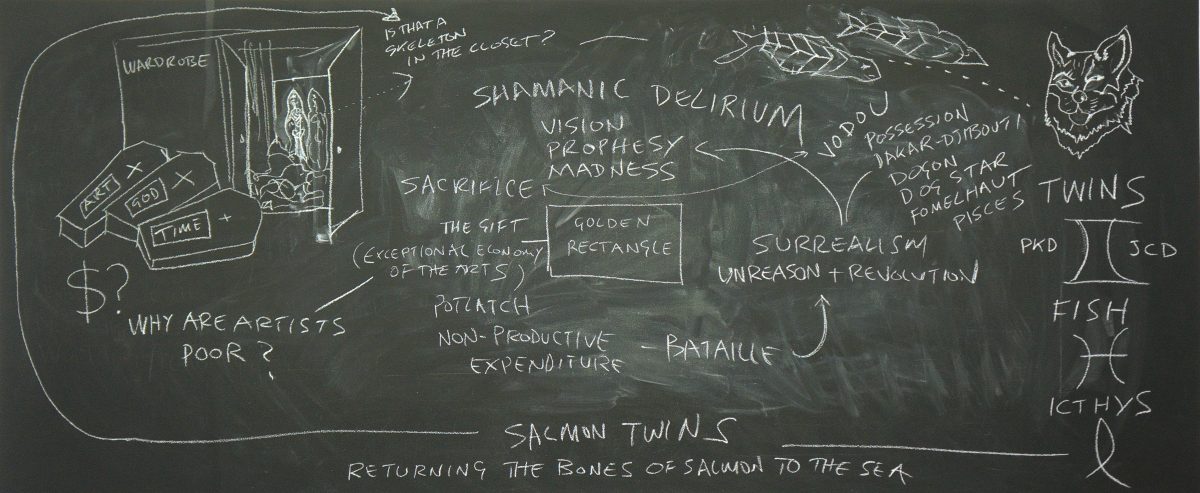This is the blog for BC Time-Slip (The Empire Never Ended), the first phase of a larger trans-disciplinary arts research project called The Skullcracker Suite. Drawing on the mythology, dances and art of the Kwakwaka’wakw peoples of British Columbia, the project’s title is a reference to Hox’hok, one of three giant cannibal birds of Kwakwaka’wakw legend. Hox’hok’s skull-cracking and brain-eating powers are imagined as a dramatic theatrical allegory for the interwoven process of colonial violence, indigenous resistance and the metaphysics of predation that bind human and non-human beings in a system of mutual, ecological and entangled co-dependency. The project is underpinned by a metaphysical world-view, drawn from Amerindian ethnology, that recognises non-human beings as persons rather than things, one in which humans have kinship with non-human beings with whom they share environmental and co-operative intelligences. From this perspective, man may be a wolf to man, but a wolf is a person to a wolf. And like Hox’hok, all beings, supernatural or otherwise, compelled to eat their other-kin, are of the cannibal kind.
Conceived as a suite of movements culminating in a multi-media arts event, The Skullcracker Suite appeals to the possibility of collectively and co-operatively imagining ‘otherwise’ modes of existence-in-common that are reconciliatory and transformative of the traumagenic effects of colonial dominion, territorial dispossession and forced assimilation to Western modes of being, behaving and thinking. Using the Brazilian anthropologist Viveiros de Castro’s concepts of ‘cannibal metaphysics’, ‘multi-species perspectivism’ and his call for the permanent decolonization of thought, the project works through the theoretical and pragmatic overlaps between models of decolonization motivated by the critical deconstruction of Euro-centric ethnography and those emerging directly from Indigenous knowledge, anti-colonial resistance and non-Western modes of living, thinking and being.
BC Time-Slip (The Empire Never Ended) began at Dynamo Arts Association in Vancouver, British Columbia in August 2016. For the duration of the one month residency I set up a special investigations bureau in the gallery, using it as the operational base for an inquiry into the story of the science fiction writer Philip K. Dick’s visit to Vancouver in 1972 to speak at a Science Fiction Convention, and his stay, after an attempted suicide, at the X-Kalay Foundation, a First Nations ex-con and addiction rehabilitation centre established by the inimitable raconteur, broadcaster and steadfast advocate of abstinence-based recovery, David Berner. The use of an Anglo-American author from the West Coast to begin a discussion about decolonization in British Columbia was a way to foreground my own identity as a white, British and European visitor whose ‘ancestors’ settled this territory over the last two centuries, and to foreground the paradox of discussing decolonization from a Euro-settler perspective.
Philip K. Dick’s 1964 novel Martian Time-Slip, after which this phase of the project was named, tells the story of a doomed UN Mars settlement project from the perspective of a schizophrenic repairman, Jack Bohlen, and a time-travelling autistic boy called Manfred. Manfred seems to be the only human on the planet able to communicate telepathically with the Bleekmen, a non-human indigenous people, reduced to servitude and abject poverty by the colonizing earthlings. The epistemological and moral uncertainties that plagued Dick throughout his life culminated in a series of visionary experiences in 1974, communicated to him by an entity he named VALIS (Vast Active Living Intelligence System) and exhaustively analysed in his posthumous work The Exegesis. Dick’s planetary colonization narratives, and his post 2-3-74 revelations that the Roman Empire had never actually ended and that we are all, unknowingly, trapped inside its Black Iron Prison, were used as critical-fictional devices to address the actual territorial dispossession of the First Peoples of what is now called Canada, and to ask how Euro-Canadian Settler populations understand their relationship to the legacies of imperialism and colonialism in the region.
During the residency at Dynamo I read The Exegesis in relation to the inter-species cosmology of the First People of the Pacific North West in an attempt to find esoteric connections between a collapsed Western mind, grappling with its own culpability for the injustices committed by its ‘race’, and a vital, pantheistic cosmology gleaned from the ethnographic archives of the Kwakwaka’wakw peoples. The working out of these reflections was presented in a series of blackboard drawings produced in the Special Investigations Room over the duration of the show. During the Dynamo residency I also worked with the artists Grégoire Dupond and Stephanie Moran to produce a series of photospheres based on events associated with Dick’s stay in Vancouver. This inquiry formed the pretext for a wider conversation about the role of artists, activists and intellectuals of Euro-Canadian, First Nations and Métis heritage, in processes of cultural decolonization in the region.
The material gathered from the 2016 residency and a second research visit to Vancouver in 2017 is currently being edited into a multi-channel video installation that will be exhibited in December 2018, marking the end of the suite’s first movement.
The Skullcracker Suite is supported by a Research Fellowship from The Leverhulme Trust.

